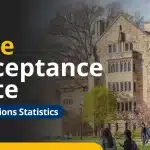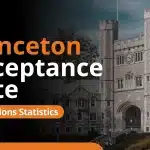Located right in the heart of New York City, Columbia University is known for its prestigious programs and a solid liberal arts focus. For these reasons, it’s ranked #12 in National Universities by U.S. News & World Report. But with that reputation comes serious competition. For the Class of 2028, Columbia’s acceptance rate was a mere 3.85%, making it one of the toughest schools to get into.
So, how do you set yourself apart in such a competitive crowd? This guide will break down exactly how to get into Columbia University. We’ll cover everything from GPA and test scores to essays and extracurriculars. Plus, you’ll get practical tips on boosting your chances and staying on top of those all-important deadlines.
- How Hard Is It to Get into Columbia University?
- Columbia University Admission Requirements
- Columbia GPA Requirements
- Columbia University SAT Requirements
- Columbia ACT Scores
- How to Increase Your Chances of Getting into Columbia University
- Columbia University Application Deadlines
- Frequently Asked Questions
- Takeaways
How Hard Is It to Get into Columbia University?
With an acceptance rate of just 3.85% for the Class of 2028, Columbia University is among the most selective universities in the world. Out of 60,248 applicants, only 2,319 students were admitted, showing just how fierce the competition is. Columbia’s place in the Ivy League and its global prestige only make it harder to secure a spot.
This low acceptance rate isn’t new. Columbia University’s acceptance rates have been steadily shrinking over the last few years:
| Columbia Class | Acceptance Rate |
| Class of 2024 | 5% |
| Class of 2025 | 3.9% |
| Class of 2026 | 3.7% |
| Class of 2027 | 3.9% |
| Class of 2028 | 3.85% |
While there was a small uptick for the Class of 2028, hovering just shy of 4%, it’s still significantly tougher than it was just a few years ago, such as for the Class of 2024 when the rate was 5%. The consistent downward trend makes each application cycle more competitive than the last.
Your grades and test scores matter, but Columbia University takes a holistic approach, meaning they’re looking at everything—your extracurriculars, leadership roles, personal essays, and recommendation letters. Columbia’s famous Core Curriculum, with its focus on a broad liberal arts education, also attracts students who are ready for a challenging, well-rounded academic experience.
In short, getting into Columbia University means you’ll need to shine in multiple areas to stand out in a pool of incredibly talented applicants.
Comparison to other Ivy League schools
How does Columbia University stack up against other Ivy League schools? Let’s take a look at their acceptance rates for the Class of 2028:
| Ivy League School | Acceptance Rate (Class of 2028) |
| Columbia University | 3.85% |
| Princeton University | TBA (4.5% for Class of 2027) |
| Harvard University | 3.6% |
| Yale University | 3.7% |
| Brown University | 5.2% |
| University of Pennsylvania | 5.4% |
| Dartmouth College | 5.3% |
| Cornell University | TBA (7.9% for Class of 2027) |
Columbia University’s 3.85% acceptance rate puts it right up there with the most selective Ivy League schools. It’s a hair above Harvard’s 3.6% and Yale’s 3.7%. Schools like Brown, Penn, and Dartmouth are a bit less competitive, with acceptance rates in the 5% range. Cornell is typically the least competitive Ivy to get into, with a rate of 7.9% for the Class of 2027, though we’re still waiting on the final numbers for 2028.
Columbia University Admission Requirements
Columbia University accepts applications through the Common Application, Coalition Application, and for QuestBridge Finalists, the QuestBridge Application. Once you submit, you’ll be able to track your progress and update any necessary details through Columbia’s applicant portal.
Getting a grasp of these requirements is key to understanding how to get into Columbia University:
- Transcript of records. Your GPA is very important. Columbia also wants to see you’ve taken on challenging coursework and excelled.
- Letters of recommendation. You’ll need two letters from teachers and one from your school counselor. If you’re aiming for Columbia Engineering, make sure one of those teacher recommendations is from a math or science teacher.
- Essays. You’ll submit a personal statement (via Common or Coalition App) and tackle Columbia-specific prompts. For 2024-25, they’re asking for a short response on books or media that shaped you, plus four more short essays. Applicants to specialized programs will need to write an additional essay related to their field.
- Extracurricular activities. Columbia looks for students who are active in their communities and have stuck with their passions over time.
- Standardized test scores (optional). Columbia is test-optional, but strong SAT or ACT scores can still give your application a boost if you choose to submit them.
- Supplementary materials (optional). Got a creative portfolio or academic research that aligns with your intended major? You can submit these through SlideRoom, but only if they truly add something to your app.
Moreover, here’s how the different pieces of your application fit together in their review process:
- Course rigor. Did you challenge yourself in high school with AP, IB, or honors courses? This shows you can handle the intensity of Columbia’s academics.
- Character and personal qualities. Show them your leadership, integrity, and the positive impact you’ve had on others.
- First-generation status. If you’re the first in your family to attend college, that’s a big deal to Columbia.
- Work experience. Part-time jobs or internships? Columbia values real-world experience and the responsibility that comes with it.
- Interest in Columbia. Show them you’re genuinely interested. This could come through in your essays, your knowledge of Columbia, or any connections you’ve made with the university.
There are other factors that matter, but not as much as the ones above:
- Class rank
- Talent or special skills
- Alumni connections
- Geographical residence
- State residency
- Volunteer work
On the flip side, Columbia University doesn’t consider your religious affiliation. Also, note that Columbia doesn’t offer interviews as part of their admissions process.
Each piece of your application plays a role, but it’s how you bring everything together—showing both your academic strength and who you are as a person—that will set you apart when figuring out how to get into Columbia University.
Columbia GPA Requirements
Columbia University doesn’t have an official minimum GPA, but if you’re aiming for one of the most selective schools out there, your GPA needs to shine. With competition growing fiercer each year, a standout GPA is a must.
Columbia average GPA
Historically, the average GPA of admitted Columbia University students hovers around 3.9. Most students have nearly perfect grades, usually with mostly A’s and maybe a few B’s sprinkled in. If you’re sitting around that 3.9 mark or higher, you’re in a pretty competitive spot.
Take note: Columbia loves to see you challenging yourself with tough courses like AP, IB, or honors. This shows you’re ready to handle the academic pressure that comes with being at an Ivy League school. While there’s no set cutoff, having a strong academic track record is essential if you want a solid shot at getting in.
What if your GPA is below average?
Don’t panic if you’re not hitting Columbia University’s average GPA exactly. Columbia looks at the full picture. If you’ve taken rigorous courses and have been steadily improving, that can still work in your favor.
And don’t forget, Columbia University wants students who can show leadership, passion, or intellectual curiosity through other parts of their application. Columbia is looking for students who will contribute to their community in meaningful ways. So even if your GPA isn’t perfect, showing you’ve got the right qualities will go a long way.
Columbia University SAT Requirements
Even though Columbia University is test-optional, submitting your SAT scores can still give your application an extra edge. If you decide to include them, they’ll be considered along with everything else you bring to the table. There’s no set minimum score, but most admitted students have pretty impressive SAT results.
Columbia average SAT
According to Columbia’s Common Data Set for 2023-2024, admitted students have some seriously competitive SAT scores. Here’s a snapshot of what the middle 50% of students scored:
| 25th Percentile SAT Composite Score | 50th Percentile SAT Composite Score | 75th Percentile SAT Composite Score |
| 1500 | 1530 | 1560 |
For each section, the breakdown looks like this:
| Section | 25th Percentile Score | 50th Percentile Score | 75th Percentile Score |
| SAT Evidence-Based Reading and Writing (EBRW) | 730 | 760 | 770 |
| SAT Math | 760 | 780 | 800 |
If you want to really stand out, aim for the 75th percentile or higher, which means shooting for a 1560+ on the SAT. While the test is optional, submitting a strong score—especially in math, where 100% of accepted students scored between 700 and 800—can show that you’re prepared for Columbia’s academic challenges.
Does Columbia require SAT?
Columbia University doesn’t require the SAT or ACT. It’s been test-optional for a few years now, so whether you submit scores or not is totally up to you. Columbia’s holistic review process means they’ll look at everything else in your application—like your course load, grades, and personal qualities—so not having test scores won’t hurt your chances.
That said, if your SAT scores are strong (within or above the middle 50% range), it could be worth sending them in. It’s a great way to reinforce your academic readiness. But if your scores are below Columbia’s average, it might be smarter to focus on other parts of your application that really shine, like your essays or recommendations.
Columbia ACT Scores
Columbia University doesn’t have a set minimum ACT score, but the higher your score, the better your chances. Even though Columbia is test-optional, submitting a solid ACT score can definitely give your application a nice boost, especially if it’s in line with the scores of students who typically get accepted.
Columbia average ACT
Admitted Columbia students tend to have pretty impressive ACT scores. Here’s a quick rundown of the middle 50%:
| 25th Percentile ACT Composite Score | 50th Percentile ACT Composite Score | 75th Percentile ACT Composite Score |
| 34 | 35 | 35 |
When you break it down by subject, it looks like this:
| Subject | 25th Percentile Score | 50th Percentile Score | 75th Percentile Score |
| ACT Math | 32 | 34 | 35 |
| ACT English | 35 | 35 | 36 |
| ACT Reading | 34 | 35 | 36 |
| ACT Science | 33 | 35 | 36 |
To be competitive, you should aim for the 75th percentile or higher, meaning a composite score of 35 or above. Most successful applicants—99% to be exact—score between 30 and 36, so if your ACT scores fall within that range, submitting them could give your application a boost.
Does Columbia prefer the ACT or SAT?
Columbia University doesn’t favor the ACT over the SAT or vice versa. They treat both tests equally. That said, more admitted students tend to submit SAT scores. For instance, in the Class of 2027, only about 22% of accepted students sent in ACT scores, while about 40% submitted SAT scores.
But that doesn’t mean you should steer away from the ACT if that’s where you shine. If your ACT scores are solid and in line with Columbia’s averages, they could help you stand out.
But if you feel your ACT scores aren’t as strong, don’t sweat it—Columbia’s holistic review process means they’ll consider other parts of your application, like your essays and extracurricular activities, to get a full picture of who you are. When figuring out how to get into Columbia, keep in mind that it’s the whole package that counts.
How to Increase Your Chances of Getting into Columbia University
With Columbia University’s acceptance rate sitting at a tough 3.85%, standing out is important. Sure, meeting the basic requirements is crucial, but you’ll need to go above and beyond in a few areas to really boost your chances of getting that acceptance letter.
1. Keep your grades up.
To be competitive at Columbia University, you’re going to need a GPA close to or above 3.9. While there’s no hard cutoff, most admitted students have grades that are pretty close to perfect, which means academics play a huge role.
Columbia also cares about how challenging your classes are. Taking AP, IB, or honors courses is a must because they’ll be looking to see if you can handle the academic rigor of the Ivy League.
To get good grades, you must:
- Organize your study time wisely.
- Focus on actually understanding the material rather than just memorizing it for the next test.
- Ask your teachers for help if you hit a wall—whether it’s through extra tutoring or just staying after class to clear things up.
- Group study can also help you see things from different perspectives.
If you’re juggling academics, extracurriculars, and maybe even a job, make sure to stay on top of deadlines to avoid cramming. Stress is real, but good time management will keep you in the clear.
2. Get involved in meaningful extracurricular activities.
Columbia University wants students who are passionate, driven, and who show leadership in what they care about. Your extracurriculars should line up with things Columbia is known for. If you’re applying to Columbia, chances are you’ve already got interests that match what they value—so make sure your activities reflect that.
To really stand out, look into programs that showcase your strengths. If research is your thing, programs like the Research Science Institute (RSI) or the Garcia Summer Research Program can give you hands-on experience that looks amazing on an application. For community service, consider leadership programs like the Youth Leadership Academy or the National Youth Leadership Council.
If competition gets your adrenaline pumping, contests like the Regeneron International Science and Engineering Fair (ISEF) or the United States Academic Decathlon will show off your intellectual edge.
But here’s the thing: it’s not just about racking up activities for the sake of it. Columbia University wants to see long-term commitment and leadership. So, don’t just join a club—lead it. Start that nonprofit you’ve been thinking about or organize a community project that matters to you. Passion is what they’re really after, so get involved in things that genuinely excite you, and show them that you’re someone who makes things happen.
3. Write excellent application essays.
Columbia University asks you to submit one personal essay through the Common Application or Coalition Application, plus a set of Columbia-specific supplemental essays. These essays are a big deal because they let you go beyond your grades and scores to show who you are as a person.
When writing your essay, think of it as telling a story, not just listing your accomplishments. Instead of saying, “I led a volunteer project for my community,” try painting a picture of a meaningful moment during the project. Maybe you realized the true impact of your efforts when you saw how it changed someone’s life, and that moment helped you understand leadership and responsibility. Admissions officers will get to know you better through these personal moments, and it’ll make your application stand out from the crowd.
Columbia essay prompts
For the 2024-25 cycle, Columbia’s supplemental essays include one question about books and media, plus four short essays. These prompts are designed to show off your intellectual interests, personal experiences, and reasons for wanting to join Columbia.
Here are the prompts:
- List a selection of texts, resources, and outlets that have contributed to your intellectual development outside of academic courses. (100 words)
- A hallmark of the Columbia experience is being able to learn and thrive in an equitable and inclusive community with a wide range of perspectives. Tell us about an aspect of your own perspective, viewpoint, or lived experience that is important to you, and describe how it has shaped the way you would learn from and contribute to Columbia’s diverse and collaborative community. (150 words)
- In college/university, students are often challenged in ways that they could not predict or anticipate. It is important to us, therefore, to understand an applicant’s ability to navigate through adversity. Please describe a barrier or obstacle you have faced and discuss the personal qualities, skills, or insights you have developed as a result. (150 words)
- Why are you interested in attending Columbia University? We encourage you to consider the aspect(s) that you find unique and compelling about Columbia. (150 words)
- What attracts you to your preferred areas of study at Columbia College or Columbia Engineering? (150 words)
If you’re applying to specific programs like the Dual BA, School of General Studies, or the Postbac Premed Program, you’ll have additional prompts to answer. Make sure your responses are thoughtful and show how your goals line up with what the program offers.
In all your essays, be real and show your genuine enthusiasm for Columbia. Storytelling and personal reflection will make your application pop and give you the best shot at getting in.
4. Get strong letters of recommendation.
Columbia University requires three recommendation letters: two from teachers and one from your school counselor. If you’re aiming for Columbia Engineering, at least one of your teacher recommendation letters needs to come from a math or science teacher.
To get a solid recommendation, start building relationships with potential recommenders early. Choose teachers who know you well and have seen you handle challenging coursework, preferably in core subjects. Engage in class, ask questions, and show genuine curiosity. Outside of class, get involved in after-school activities or clubs where they might be advising. The more they know about you, the more personalized their letter will be.
When it’s time to ask for a letter, do it politely and give them plenty of notice—ideally months in advance. Make the process easy by providing them with a resume or a brag sheet. A gentle reminder before the deadline won’t hurt either. The goal is to have them write something specific and insightful that goes beyond generic praise.
5. Take the ACT/SAT and score high.
Columbia University is test-optional, but if you’re proud of your standardized test scores, submitting them can boost your application. You should aim for a 1560 or higher on the SAT or a 35 or above on the ACT, as these scores align with Columbia’s 75th percentile of admitted students.
To hit those target scores:
- Start by taking practice tests to identify weak spots and get comfortable with the format. For the SAT, focus on improving your math and evidence-based reading and writing sections, as those are crucial for your composite score. For the ACT, work on math and science, two sections Columbia applicants tend to excel in. If you need extra help, consider tutoring or a prep course.
- During the test, manage your time carefully—don’t get stuck on one section and leave questions unanswered. Review your mistakes after practice tests so you can avoid them next time.
6. Apply through Early Decision.
Early Decision (ED) can significantly boost your chances of getting into Columbia University. Unlike Regular Decision (RD), where you can apply to multiple schools, ED is binding—if you’re accepted, you’re committed to attending Columbia. This shows admissions officers that Columbia is your top choice, which can work in your favor.
For the Class of 2028, Columbia’s ED acceptance rate was 11.9%, while the RD rate was just 2.95%. That’s a huge difference, and it highlights how ED can improve your odds, especially if you’re a strong applicant.
However, ED comes with responsibilities. You’ll need to have your entire application—essays, recommendations, test scores (if submitting), and extracurriculars—ready by November 1st. And since ED is binding, make sure Columbia is your absolute top choice. If you’re unsure or want to compare financial aid offers, RD might be a safer bet.
In short, ED gives you a competitive edge, but only if you’re fully prepared and certain that Columbia is where you want to be. If it’s your dream school and you’re ready to commit, ED could be your best shot.
Columbia University Application Deadlines
When applying to Columbia University, keeping track of deadlines is crucial to stay on top of things. Here’s a quick breakdown of the important dates you need to know:
|
Date |
Event |
|
August 1 |
Application Start |
|
November 1 |
Early Decision Deadline |
|
Mid-December |
Early Decision Notification |
| Mid-January |
Early Decision Confirmation |
| January 1 |
Regular Decision Application Deadline |
| Late March |
Regular Decision Notification |
| May 1 |
Reply Date |
You can start working on your Common Application, Coalition Application, or QuestBridge Application as early as August 1. If you’re aiming for Early Decision, your deadline is November 1—this is earlier than the Regular Decision deadline of January 1. Keep in mind that Early Decision is binding, meaning if Columbia accepts you, you’re committing to go.
And don’t forget about May 1—that’s College Decision Day. By then, all admitted students need to confirm where they’ll be attending and submit their enrollment deposit, locking in their spot at Columbia or whichever school they’ve chosen.
Frequently Asked Questions
1. What is the acceptance rate for Columbia University?
For the Class of 2028, Columbia University’s acceptance rate is just 3.85%. With odds like that, it’s no surprise that Columbia remains one of the most selective Ivy League schools.
2. Is Columbia test-optional?
Columbia University is test-optional, so you can decide whether or not to submit SAT or ACT scores. However, if you’ve got strong scores—think 1530+ on the SAT or 34+ on the ACT—submitting them can still give your application a boost.
3. What GPA do you need to get into Columbia?
To be competitive, you should aim for a GPA of 3.9 or higher. Columbia University also looks closely at course difficulty, so stacking your schedule with AP or IB classes can help show you’re ready for the challenge.
4. What major is Columbia University known for?
Columbia University shines in Political Science, Economics, Engineering, and the Humanities. Its famous Core Curriculum ensures all students get a solid liberal arts foundation, no matter their major.
5. How much is tuition at Columbia University?
For the 2024-2025 academic year, tuition is $71,170, but with housing and other fees, the total cost can hit $93,417. Fortunately, Columbia University offers generous financial aid to help make it more affordable for admitted students.
Takeaways
When thinking about how to get into Columbia University, here are five important things to keep in mind:
- With a 3.85% acceptance rate for the Class of 2028, Columbia University is one of the most selective schools out there.
- To stay competitive, aim for a 3.9 GPA or higher, and make sure you’re loading up on challenging courses like AP or IB classes.
- Columbia doesn’t require SAT or ACT scores, but if you’re hitting 1560+ on the SAT or 35+ on the ACT, it’s definitely worth submitting them to give your application an extra boost.
- Columbia looks at everything, so be sure to stand out in leadership roles, write thoughtful essays, and get solid recommendation letters from people who really know you.
- Think about getting expert advice. A college admissions consultant can help you navigate the process and make your application stand out in all the right ways.






















